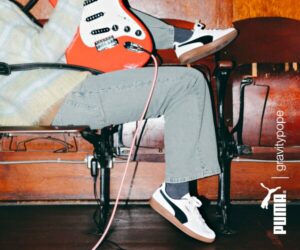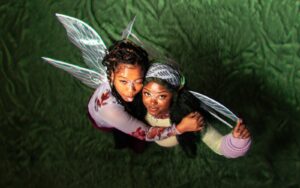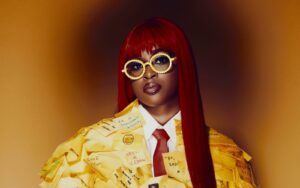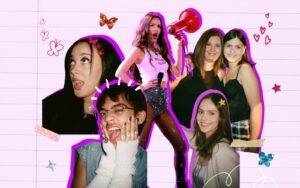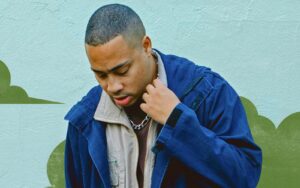Jack J: Architect of Sound and Space
The Mood Hut co-founder turns instrumentation into club bangers, attics into dance floors, and studios into havens of collaboration.
by Maggie McPhee
- Published on
It’s impossible to talk about Jack Jutson’s music in a vacuum. Not only has he released some of the most innovative house music of the 2010s but he also co-founded Mood Hut, the collective and label that put Vancouver on the map for excellent electronic music production and decade-defining illicit parties. Jutson worked on Opening the Door, his first full-length album released this April, over much of this period, and it feels at once rich with that history and boundary bending, like a futuristic nostalgia.
When I connect with Jutson it’s as if my Zoom has teleported us back to 2012: he’s starting his sunny Saturday at China Cloud Studios in Vancouver’s Chinatown. Later, Liam Butler and Ian Wyatt, aka Local Artist, will stop by to record the monthly Pender Street Steppers NTS show. All told, that’s the three Mood Hut pioneers gathering where they first prototyped their all-night parties to do what they always have: share their friend’s music with the wider world. “We didn’t start the collective with any intention of it becoming more than doing some local parties, and having a studio and making music together,” Jutson tells me. That so little has changed in the decade Jutson and company rose to international prominence is a testament to the label’s communal and collaborative heart.
Since Jutson has played such an integral part in creating the conditions for Vancouver’s house, ambient, and techno sounds to form and flourish, it may come to a surprise he actually hails from a different coastal metropolis. Growing up in Sydney, Australia, with a musical father, Jutson learned to play guitar, bass, keys, and drums by the time he hit high school. “I was like the music kid equivalent of being a theater kid,” he says, “I was in the music room every lunch hour jamming with people.” At 15 he got a small mixer and began experimenting with sampling and software. He combined his instruments with the new gadgets and never looked back. “That formed how I wanted to approach music and still do now 20 years later.” Opening the Door features Jutson playing every instrument save Linda Fox’s lush saxophone on “Closing the Door” and “Clues 1.”
Jutson relocated to Vancouver in time to start university, where he met Butler on orientation day in line for hot dogs. They struck up a robust MSN messenger correspondence and formed the pop-rock band No Gold one week later. Over the years touring they grew increasingly interested in dance music and DJing, and proportionately frustrated by the fruitless music industry grind that many emerging touring bands are faced with. By the time they disbanded to form Mood Hut they agreed not to worry about marketing or popularity. Jutson released solo stuff as Jack J and continued collaborating with Butler as Pender Street Steppers. The collective itself grew so large, counting in its numbers Aquarian Foundation, Cloudface, and Neo Image, they kept things basic to ensure everyone stayed on the same page. “The simplest way was to say, ‘we’ll create music, we’ll create imagery, we’ll do parties, and then people can make of it what they will.’”
Despite no explicit interest in doing so, they struck gold. Vancouver had incredible talent waiting to be platformed and audiences with unsatiated appetites for dancing until sunrise. In a blink, Juston was DJing around the world, showcasing his hometown’s latest offerings.
Between the cracks of those hectic years, Jutson found time to make songs for himself. In the wee hours before bed he’d pick up a guitar or keyboard in his apartment’s small studio and start shaping new sonic worlds. Typically, he layers synths, bass and drums over an initial chord progression. He fleshes out melody, cadence, and rhythm with filler lyrics then writes the words bit by bit. Lyrics, sparse in his earlier work, have turned into a treasured part of the process. It’s an organic, open-ended experiment in which he loops sections and sings until he discovers something right. “I don’t make plans in my life, generally. With music, definitely not,” he says. “I walk into the studio and sit down and whatever happens happens. I think I just trust it’s going to make sense.”
Opening the Door is a collection of these private moments recorded over five-or-so years. The pandemic offered some pause in which Jutson was able to put together a polished product. Even with its long gestation time, the album feels united by the indescribable feeling of growing up. Jamaican dub, jazz, and ambient inflections add aural dexterity to an otherwise unwavering emotional core. Jutson folds together his younger self’s love of uplifting music with life’s inevitable hardships. Melancholy permeates the spaces between his heavy hi-hat and jubilant rhythms. “I used to let the world pass through me like a smiling child/Now I don’t feel the fire and I can’t see the sky,” he sings on “Only You Know Why.” Music is the greatest medium Jutson has to express himself and connect with others. “I’ve felt like it’s been understood, and other people feel it as well,” he says. “That’s been my favourite part of putting this record out.”
The other cohering factor is a presence discernible throughout the Mood Hut catalogue: the environment itself. Vancouver’s laid-back vibe, its glass buildings, mountains and seascapes, all coalesce in the fluid, crystalline and dreamy music. Formative experiences in the surrounding areas, further north and on the Gulf Islands, follow Jutson into the studio. His relationship with Vancouver is symbiotic: for all he’s given the city, the city has given back. “I personally owe everything I have, all of my musical relationships, my studio, everything to Vancouver and the particular energy that’s here.”
Jutson plays his first live show in a decade in Richmond on September 10. “I really miss being on stage and performing my music,” he says. “It seems like a funny thing to say but when you’ve been a DJ exclusively for 10 years you start to think about how that relationship between your music and yourself as an artist gets a little bit murky. So I’m really looking forward to touring with a small band in the fall and into next year.”
By Johnny Papan
Seattle’s alt-rock superheroes summon new and old habits on Dark Matter.
By Sebastian Buzzalino
The Francophone post-punk trio bite the proverbial apple and turn up the volume on their new EP, Serpent Échelle.












